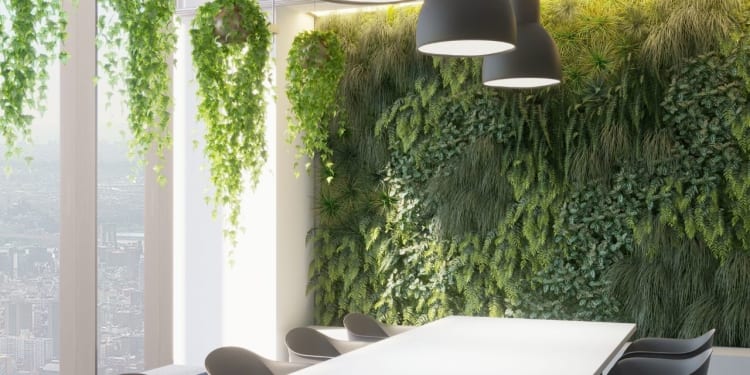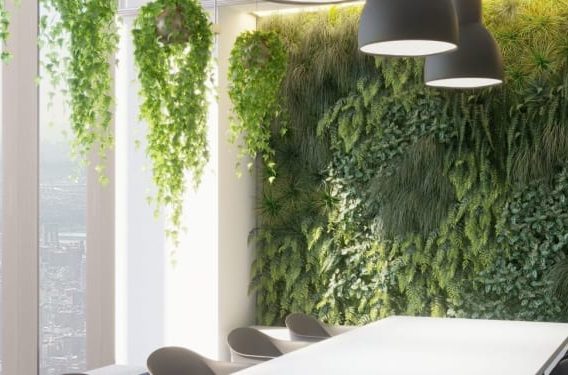Allwork.Space shares strategies to create sustainable coworking spaces including the use of solar panels, recycling, and curbing office equipment consumption.

This article was originally published by Allwork.Space.
It’s clear that humanity needs to start doing whatever it can to slow down the effects of climate change. There are many practices and daily habits that can be implemented, big or small, that can greatly reduce our carbon footprint.
This behavior can start at home, with simple things such as recycling and composting, using less water, and installing solar to the home, but what about in the corporate world?
Particularly over the last couple of years there has been a significant push for improved sustainability across all industries, including the office sector.
Buildings, namely coworking spaces, should ensure that they are being as eco-efficient as possible. Not only is this cost-beneficial, but it preserves the environment in which we live.
Here are some sustainable coworking tips to implement:
- Install solar to the building: Besides being drastically better for the environment, companies can reap some long-term savings from their initial investment by installing solar, and many states now offer incentives (like rebates and the ability to sell excess energy to the power company) for solar energy users.
- Use natural light: Artificial lighting represents 40% of electricity consumption in a typical office building, and almost a quarter of all electricity in America, which is often unnecessary. Coworking spaces should use daylight wherever possible, which will decrease energy consumption.
- Encourage recycling:If your office doesn’t have a recycling program, work with your office manager and custodial staff to set one up for paper, aluminum cans, and plastic bottles and containers.
- Encourage employees to rethink their commute and work-related travel: Whenever possible, people should walk, bike, carpool, or use buses, trains, or light rail to get to work. If commuting by car is unavoidable, people should invest in a fuel-efficient vehicle. It might also be helpful to reduce work-related travel by meeting with coworkers via videoconferencing and other technologies.
- Go digital: It isn’t necessary to print out a meeting agenda for every member every meeting; it can be incorporated into a slideshow or simply sent over email.
- Curb office equipment energy consumption: Configure your devices to automatically enter low-power modes when idle, and remember that anything plugged in sucks energy, even when turned off.
- Turn off lights: Turning off lights in unoccupied public spaces like bathrooms, kitchens, and conference rooms not only conserves energy but can start (or reinforce) a good habit in coworkers.
- Watch the temperature in summer: Most offices could stand to raise the temperature a few degrees. Many people in the office keep sweaters and extra clothing at their desks at the height of summer because the office is so much colder than the outside temperature.
- Use green cleaning products: Environmentally friendly cleaning products protect the health of not only cleaning staff but also employees by eliminating harmful substances and odors from the office.
- Instate an “everything off at night” rule: The majority of office power is consumed by machines that are off, but still plugged into a live outlet. Standby power is a huge environmental culprit and expense. Coworking spaces should make it a policy that everyone has to turn off their equipment when they leave for the night, and the last person out needs to make sure they power down all of the communal tech (printers, copiers, etc.).
Here are some model sustainable coworking spaces:
Good Coworking in Dallas, Texas: This space believes in health before hustle. It offers wellness classes and fosters an awareness of how work can affect the planet and others around us.
“Americans spend 90% of their time indoors, yet so many buildings aren’t good for us. Because of this, we are based in the newly renovated building on South Good-Latimer, pursuing LEED + WELL Building Certifications that will facilitate well-being and productivity through excellent air quality, ergonomic furniture, and access to natural light,” the space says on its website.
Second Home in London, England: This sustainable coworking company has a portfolio of four workspaces across London all of which are in reused buildings to limit the carbon footprint that comes with building from scratch.
One of the most unique features of the Holland Park workspace is the “bubble roof” which inflates and contracts to adjust the temperature and light filtration. This innovative design reduces the need for energy intensive heating and cooling. Within all of their London spaces, you’ll find La Despensa cafes, where the regularly changing menu is created seasonably and the produce is sustainably sourced from farm to table.
Fora in England: Fora is another primarily London based provider, with other locations in Leeds and Reading. Fora is striving to be net zero carbon by 2030 and has a range of sustainability initiatives and facilities in the spaces. The buildings use 100% renewable energy and everything is recycled, from food to batteries.
Single-use plastic has also been reduced, and Fora works with Trees for Cities to plant thousands of urban trees each year. From a transportation perspective, cycling facilities are offered and discounted cycle hire is offered with Brompton Bike to encourage more sustainable commuting options.
Paddington Works in London, England: This space is carbon neutral using 100% certified renewable electricity. Smart lighting has been implemented into the space that moves with the human circadian rhythm to help members maintain productivity and focus for longer.
The workspace is equipped for members with electric cars, with car parking spaces available that have access to electric charging ports. Paddington Works has even created a vertical farm on-site which members and visitors can take home.


